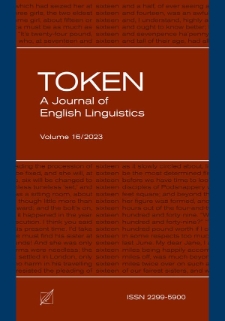Digital Library of the Jan Kochanowski University contains 13 466 digital objects
Object
Title: Acquiring epistolary literacy in nineteenth-century New England
Group publication title:
Contributor:
Newman, John G. Ed. ; Dossena, Marina. Ed. ; Schmied, Josef. Guest ed. ; Bondi, Marina. Guest ed. ; Dontcheva-Navratilova, Olga. Guest ed. Perez-Llantada, Carmen. Guest ed.
Abstract:
The concept of “epistolary literacy”, or the skill of letter writing, was first applied by Susan Whyman in The Pen and the People (2009) when analysing the letters of English families from the period 1660-1800. The present study applies the concept to nineteenthcentury New England, and presents five case studies of families from different socioeconomic backgrounds in order to study the question of how they acquired epistolary literacy. Since letter writing was not taught in schools, this paper investigates other means that were available to people eager to communicate with distant relatives and friends. Three possibilities are explored: the use of letter-writing manuals, the example of letters received, and practicing the skill through letter writing itself. The various skills identified in the letter collections, linguistic as well as epistolary, collocate with the families’ different socio-economic backgrounds. While the most highly placed family could draw on a teacher-caretaker’s efforts to assist their children in communicating with their parents, the family at the lowest end of the social scale struggled with the need to acquire sufficient epistolary literacy to be able to stay in touch. One of the families, whose main proponent emigrated to Peru and lost his native language in the process, shows how their Spanish-speaking descendants used letter writing with American relatives both to acquire this skill, and to regain a command of English.
Table of contents:
Contents
7 Josef Schmied, Marina Bondi, Olga Dontcheva-Navratilova, Carmen Pérez-Llantada, Language variation and change in academic writing: Recent trends through globalisation and digitalisation
25 Olga Dontcheva-Navratilova, Academic writing conventions in Czech English-medium linguistics journals: Continuity and change over the last 30 years
55 Marina Bondi, Jessica Jane Nocella, Academic writing conventions in English-medium linguistics journals in Italy: Continuity and change over the last 30 years
89 Marina Ivanova, German English-medium linguistics journal abstracts over the last 30 years: Quantitative and qualitative structural developments
115 Giuliana Diani, Research article abstracts in English and Italian: Generic and cross-linguistic variation over the last 20 years
143 Krystyna Warchał, Concluding sections over 30 years of research writing: The case of a Polish scholar
169 Josef Schmied, Marina Ivanova, English MA theses at a German university before and after the Bologna reform: Comparing global rhetorical structures and stance in Linguistics and Cultural Studies
197 Tereza Guziurová, “The aim of this paper is…”: Frame markers in English as a lingua franca of academic writing
223 Enrique Lafuente Millán, European research project websites and corporate websites: Patterns of evaluation and genre evolution Varia
251 Cecilia Lazzeretti, Language, narrative and structure of story telling in museum communication: A diachronic approach
277 Gloria Mambelli, “It is a long road from sorrow to joy”: Metaphors of happiness and sadness in Late Modern English private correspondence
301 Giulia Rovelli, Towards a historical corpus of Canadian English letters and diaries
325 Ingrid Tieken-Boon van Ostade, Acquiring epistolary literacy in nineteenth-century New England Reviews
357 Michael Skiba, Participial Prepositions and Conjunctions in the History of English, Munich: utzverlag, 2021, 235 pp. (Reviewed by Rafał Molencki, University of Silesia in Katowice, Poland)
Place of publishing:
Physical description:
ISSN:
Publisher:
Jan Kochanowski University Press
Date issued:
Identifier:
oai:bibliotekacyfrowa.ujk.edu.pl:12875 doi:10.25951/11269
Language:
Is part of:
Type:
Access rights:
Format:
Object collections:
- JKU Digital Library > University Publishing > Serial publications > "Token : A Journal of English Linguistics"
Last modified:
Apr 4, 2025
In our library since:
Apr 4, 2025
Number of object content hits:
102
All available object's versions:
https://bibliotekacyfrowa.ujk.edu.pl/publication/11269
Show description in RDF format:
Show description in OAI-PMH format:
| Edition name | Date |
|---|---|
| I. Tieken-Boon van Ostade, Acquiring epistolary literacy in nineteenth-centuryNew England | Apr 4, 2025 |

